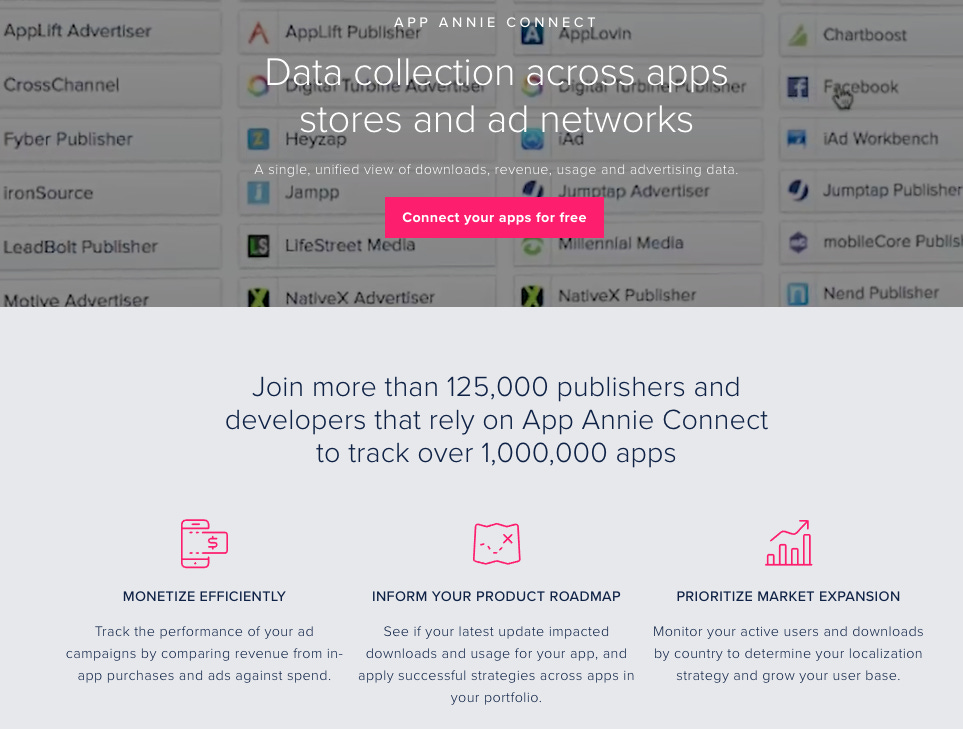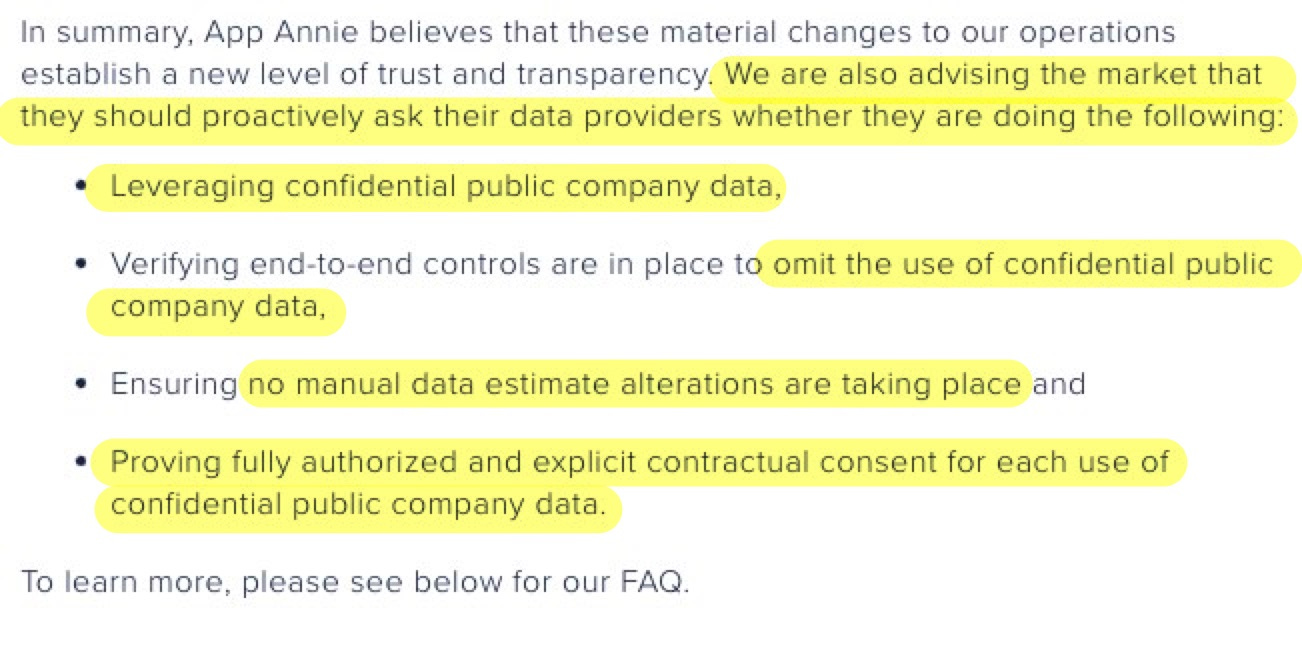On App Annie, Alternative Data, and the SEC
Hold on to your socks everybody and get to the implications at the end!
Welcome to the GameMakers newsletter. Join today to stay informed about current and relevant strategic insights that can help you win!
🎧 Listen to GameMakers content on Spotify or Apple Podcasts
📺 Watch on Youtube
Thought experiment:
What would happen to game industry executives throughout the games industry without App Annie or other “alternative data” sources telling them what their opinions on games should be?
Disclaimer: Hey folks, I just want to be clear here that I’m a fan of App Annie. Further, I have partnered with and done events and podcasts with both leading alternative data providers (meaning App Annie and Sensor Tower).
What Actually Happened?
There’s a fair amount of bad info out there (and good) on what actually happened at App Annie and since I’m a fan of App Annie, I decided to go check it out for myself.
But just as an example, you’ve got folks like Jason Calacanis suggesting:
“When things get overheated and the government is giving away a bunch of free money. Then you start to see see a lot of corruption and you see a lot of fraud. Today’s fraud is the SEC has charged mobile data seller App Annie…”
🙄 Holy confirmation bias! He didn't even seem to be aware that this was an issue from 2014-2018.
What is App Annie Connect?
Mobile apps could send their data to App Annie who would then provide some analytics and dashboarding features for their customers. Further, clients that used Connect could then potentially get discounts on the overall App Annie service.
Connect Used for Estimation
Based on the SEC Proceeding describing the case against App Annie, the crux of the complaint seems to be around the use of Connect data and more specifically from public companies:
So the key here is the use of public companies’ Connect data that was then used to inform “Intelligence estimates.”
Even further:
Just to be clear, the key problem with all of this is that this information could then be used by hedge funds or others to give them a trading advantage in the stock market. This is, in fact, a form of insider trading. The SEC defines insider trading as follows:
Illegal insider trading refers generally to buying or selling a security, in breach of a fiduciary duty or other relationship of trust and confidence, on the basis of material, nonpublic information about the security.
Remember this term “material, nonpublic information” aka MNPI.
The Remedy
Despite the fines and the Proceeding being published just recently, it seems that the SEC investigation started much earlier and they had already engaged App Annie to change its data practices. Note that changes seemed to have been initiated including the resignation of former CEO Schmitt in June of 2018.
Overblown Outrage?
A bunch of news and slack chatter have surfaced recently with some amount of outrage. And while I understand that what happened before wasn’t cool, I do think it’s a little bit of overblown outrage if I’m being honest.
In the context of all the other nonsense and shenanigans that have occurred in our industry that has had zero enforcement occur, this is the issue that gives you outrage? Really?
Maybe none of you were following me over the past few years when I used to do the This Week In Games podcast, but there’s certainly a lot of other things I think people should be mad about.
In the past, a number of alternative data providers used whatever means they could to acquire and utilize data in ways to inform private game data performance. Some game companies today, use whatever means they can to get data any way they can to compete against other companies.
Let’s be real though. After Apple pulled the Top Grossing list from the AppStore, I’m sure everyone in the industry had to have some suspicions that getting great data estimates may have included a bit of creative data sourcing.
Since those days, we sort of knew alternative data providers were getting data from “somewhere.” Without naming specific actions and companies, there have been a number of articles published on this topic. App Annie was purported to have used their Connect program to gain access to data, but there are a number of other ways other alternative data providers were able to get access to data:
Trojan Horse Apps: VPN, ad-block, and other apps on Android were used to gain user permissions to then collect user data on how they use games.
Email Apps: Some free email providers traded free user email usage for access to data including things like IAP receipts.
Implications to Data Estimates
The big open question that no one seems to be asking now though is:
Without proprietary data from public companies, how good can algorithms and data science on their own be in determining download and revenue estimates for apps?
To me, this should be a huge concern especially for those game industry execs who otherwise can’t form any opinions on a game. 🤣
Based on just 2 spot checks, hence with VERY limited data points, it seems that App Annie is still somehow really close with their estimations even without proprietary data. Or perhaps with data but now on an aggregated, anonymized basis.
If anyone has any other data points pls feel free to DM me!
I will say though that a few years back the top data providers did seem to be getting closer together in their estimates. Currently, what I’m seeing are estimates that are between 15-30% different sort of across the board.
Industry Fall-out
In terms of implications to the games industry, I do think the early indications are that game industry execs are still safe - they’ll likely still get good alternative data. Dammit!
To a large degree, I assumed this news would just blow over and things would just be business as usual until I read the following from App Annie’s website on Trust & Assurance:
Are they saying what I think they are saying? 😱
There seems to be an implication here that other alternative data providers aren’t in compliance with their data.
That couldn’t be right, could it?
There are also two other more minor implications from that above note as well:
It would appear that it may not be illegal for an alternative data provider to use confidential public company data so long as they have consent from the company. I imagine the nature of that consent would likely be pretty tricky legally though.
However, even if they have rights to ingest proprietary public company data, those data points cannot be used to manually override the primary algorithm or algorithms that drive the estimations
Ok, let me now get to a potential doozy of an implication for the games industry. This is where I think y’all may need to sit down and take a breath. Stay with me here because I’m gonna connect a few dots for you.
Further, just to be clear, I’m a conspiracy theorist, but damn am I right a lot…
First of all, note the times and sentiment of the society in which we’re currently living. There are broad movements afoot politically and socio-economically.
Hence it was a surprise, but not a surprise when I saw the following news from The Wall Street Journal:
WTF? The SEC is getting involved in “workplace practices” now?
The scope of the SEC is defined as follows:
Protect investors
Maintain fair, orderly, and efficient markets
Facilitate capital formation
Guys, I believe, the SEC is expanding its scope under the guise of “Protect investors.” The SEC suggests it’s getting involved to investigate disclosure. However, I believe this is a dangerous and slippery slope as the purview of what is considered MNPI (material, non-public information) is also likely expanding.
But here’s where things could get interesting.
Peter Greene, a lawyer for top-50 hedge fund managers recently held a webinar on the implications of the SEC ruling on App Annie.
The first interesting take-away from this webinar was there was a huge focus of the webinar on how hedge fund managers should protect themselves from the SEC. Wait, what?
Yes! The focus wasn’t on App Annie, it was on the customers of the alternative data and how hedge fund managers need to be careful about themselves getting into trouble.
We cannot overstate the importance of this enforcement proceeding. And this is the first one. And it’s a securities law proceeding.
Connecting the Dots
So what can that mean for us in the games industry?
Well, what do we as customers of alternative data providers use the data for:
Selecting what game markets to compete in and to greenlight game projects
M&A analysis
Corporate resourcing and organization (e.g., Netflix deciding to build out a games division)
A super important point from Peter Greene:
You need to re-underwrite your alternative data provider… You need to ask that of other [alternative data providers] as well. That manipulation point is really, really important here... The next time the SEC brings one of these if they come to you and they say ‘Well did you ask if they were doing anything similar to what we found in that other case?’ And if you say ‘No’, the SEC is gonna say ‘Well we gave you the roadmap to do better diligence here. You didn’t do it. Now you know what? Now we’re not only gonna charge the app provider. Now we’re gonna charge you, because you buried your head in the sand.’
So here’s the big question now:
Can I conceive of a world in which SEC enforcement actions are brought on public companies that conducted M&A transactions, launched a game, or created a new games division based on the use of an alternative data provider deemed by the SEC as “bad”?
What about public companies that are using access to data from vertically integrated ad networks (aka MNPI) to inform product strategy?
LILA Games is building one of the most ambitious shooter games ever designed! We are currently hiring aggressively in Bangalore, India. See below.
Visit our website!
If you know someone who may be a good fit, please contact me. Referral bonuses are given for closed candidates!!!
LILA Openings (Bangalore or Remote):
LILA Openings (Bangalore Only):













